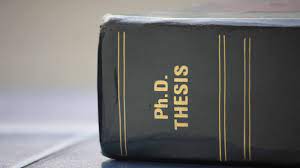Navigating the Labyrinth: Strategies for Refining Broad Research Questions in Ph.D Papers
Embarking on a Ph.D. journey is akin to navigating a labyrinth of knowledge, with the initial challenge often lying in the process of narrowing down a broad research question. In this blog, we explore the intricate strategies that researchers employ to refine and focus their inquiries, ensuring precision, relevance, and depth in their Ph.D. papers.
Exploration through Preliminary Research:
The journey toward a refined research question begins with exploration. Researchers delve into existing literature, conducting preliminary research to familiarize themselves with the landscape of their chosen field. This initial immersion helps identify key themes, gaps, and potential avenues for inquiry, laying the groundwork for the refinement process.
Critical Evaluation of Existing Literature:
Researchers critically evaluate existing literature to pinpoint the strengths and limitations of previous studies. Through this evaluation, they identify gaps in knowledge, contradictions, or unresolved issues. These gaps become pivotal in shaping the refined research question, ensuring that the study contributes meaningfully to existing scholarship.
Consultation with Advisors and Peers:
Collaboration is a cornerstone of scholarly inquiry. Researchers consult with advisors and peers to gain diverse perspectives on their initial research ideas. Advisors, with their wealth of experience, offer insights into the feasibility and relevance of different research directions. Peer discussions provide valuable feedback, helping researchers refine their questions based on collective expertise.
Alignment with Research Objectives and Goals:
A crucial step in narrowing down a broad research question is aligning it with overarching research objectives and career goals. Researchers reflect on the purpose of their Ph.D. study, considering how the refined question contributes to their academic specialization and long-term aspirations. This alignment ensures coherence and significance in the chosen research direction.
Pilot Studies and Feasibility Analysis:
Before committing to a specific research question, researchers often conduct pilot studies or feasibility analyses. These preliminary investigations help assess the practicality of the proposed research, identifying potential challenges and refining the focus based on the outcomes. Pilot studies serve as a testing ground, allowing researchers to fine-tune their inquiries before the full-scale research endeavor.
Integration of Interdisciplinary Perspectives:
The interdisciplinary nature of knowledge often invites researchers to integrate perspectives from multiple fields. By drawing on insights from related disciplines, researchers enrich their understanding of the research landscape. This integration can lead to the formulation of refined questions that transcend disciplinary boundaries, offering a holistic perspective on the chosen topic.
Deliberate Definition of Scope and Boundaries:
Refining a research question involves the deliberate definition of scope and boundaries. Researchers carefully delineate the parameters of their study, clarifying what falls within and outside the scope of inquiry. This precision ensures that the research question is manageable, allowing for in-depth exploration without spreading resources and efforts too thin.
Continuous Iteration and Feedback Loop:
The process of narrowing down a broad research question is iterative. Researchers continuously refine and reshape their inquiries based on ongoing feedback, emerging insights, and evolving research goals. This iterative approach fosters adaptability, ensuring that the research question remains dynamic and responsive to the nuances of the study.
Conclusion:
Narrowing down a broad research question for a Ph.D. paper is a dynamic and iterative process that requires a combination of exploration, critical evaluation, collaboration, alignment with objectives, pilot studies, interdisciplinary integration, and deliberate scope definition. As researchers navigate the labyrinth of knowledge, the refinement of the research question becomes a pivotal step, setting the stage for a focused, relevant, and impactful Ph.D. study. Through thoughtful and strategic navigation, researchers embark on a journey that not only refines their inquiries but also contributes meaningfully to the expanding landscape of scholarly knowledge.
FAQ:
Why is narrowing down a broad research question important for Ph.D. papers?
Narrowing down a broad research question is crucial for Ph.D. papers as it ensures precision, relevance, and depth in the study. It helps researchers focus their inquiries, contribute meaningfully to existing scholarship, and align their research with overarching objectives and goals.
How do researchers initiate the process of narrowing down a broad research question?
Researchers initiate the process by conducting preliminary research to familiarize themselves with the existing literature. Critical evaluation of previous studies, consultation with advisors and peers, alignment with research objectives, and exploration through pilot studies are key steps in refining a broad research question.
Why is consultation with advisors and peers important in refining research questions?
Consultation with advisors and peers is vital as it provides diverse perspectives and expert insights. Advisors offer guidance on feasibility and relevance, while peer discussions contribute valuable feedback, helping researchers refine their questions based on collective expertise.
What role do pilot studies and feasibility analyses play in narrowing down a research question?
Pilot studies and feasibility analyses serve as testing grounds to assess the practicality of a research question. They help researchers identify potential challenges, fine-tune their inquiries, and ensure that the chosen research direction is viable before embarking on full-scale research.
How does interdisciplinary integration contribute to refining research questions for Ph.D. papers?
Interdisciplinary integration enriches researchers' understanding by drawing insights from multiple fields. This integration often leads to the formulation of refined questions that transcend disciplinary boundaries, offering a holistic perspective on the chosen topic.

















